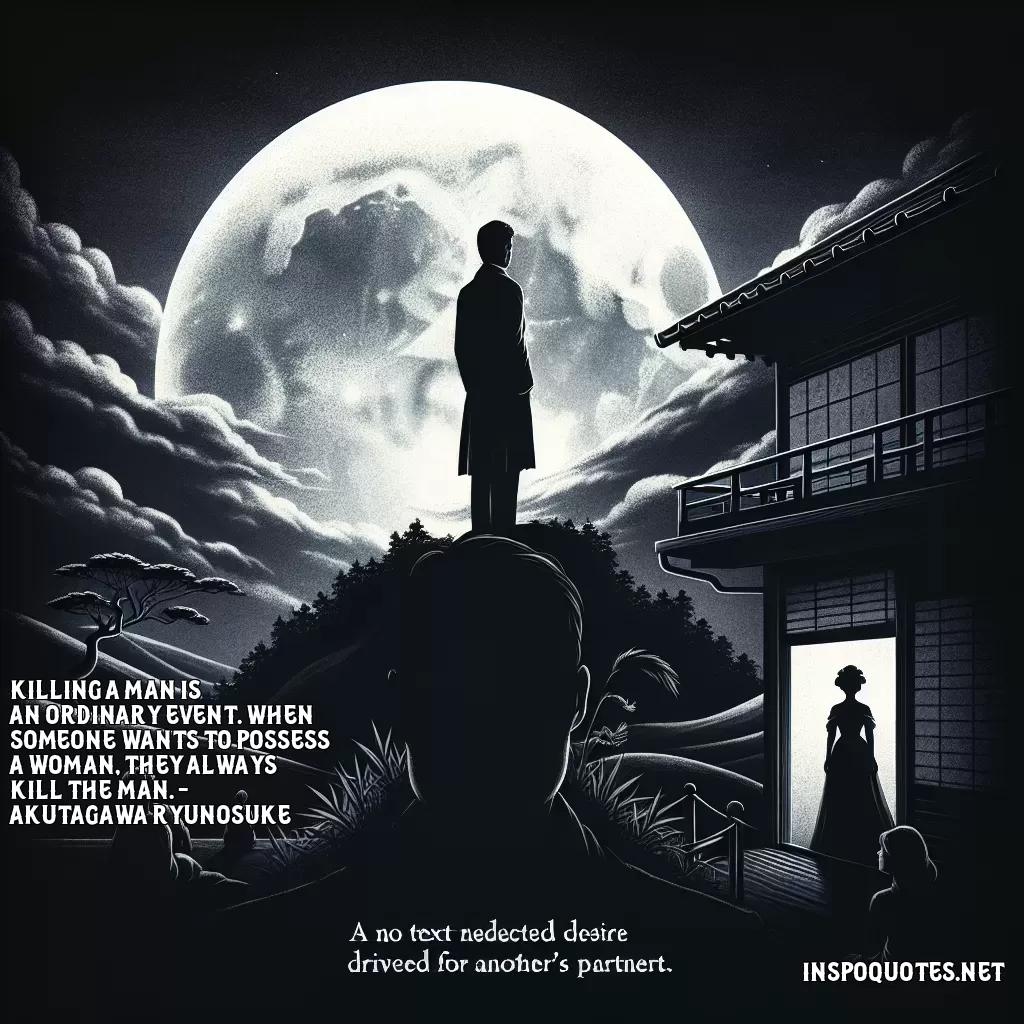
Killing a man is an ordinary event. When someone wants to possess a woman, they always kill the man. - Akutagawa Ryunosuke
Author: Akutagawa Ryunosuke
👁️ 13 views

Killing a man is an ordinary event. When someone wants to possess a woman, they always kill the man. - Akutagawa Ryunosuke
👁️ 13 views
The quote by Akutagawa Ryunosuke highlights the extreme measures some individuals might resort to in the name of possessiveness and desire. By stating that "killing a man is an ordinary event," the author implies that such acts of violence can become so frequent or normalized in certain contexts that they lose their extraordinary nature. The statement suggests a grim view of human behavior, where violence is an accepted part of life and not an especially shocking occurrence. It reflects the dark side of human emotions and desires, where jealousy and a sense of ownership can drive someone to commit murder. The second part of the quote, "When someone wants to possess a woman, they always kill the man," focuses on possessiveness and its destructive consequences in romantic or sexual relationships. This highlights a traditional and patriarchal mindset where women are seen as objects or prizes to be claimed, often leading men to eliminate perceived rivals or obstacles. The use of the word "always" underscores how ingrained and inevitable this pattern of behavior can be, although obviously exaggerated for dramatic effect. The larger theme here might be a critique of the societal norms that condone or overlook such violence and the toxic masculinity that equates love with possession. It serves as a commentary on how unchecked emotions and societal pressures can lead to tragic outcomes. The quote forces readers to confront the harsh realities of human nature and the potential consequences of deeply flawed perceptions of love and possession.
Quote By: Akutagawa Ryunosuke
He graduated from the prestigious University of Tokyo, where he studied English literature. Akutagawa began his writing career in the early 1910s, publishing his first story, "Rashomon," in 1915. This story, which narrates a crime from multiple conflicting perspectives, reflects Akutagawa's fascination with the elusiveness of truth and the subjective nature of reality. His unique narrative style, characterized by psychological depth and intricate storytelling, quickly garnered attention.
One of his most celebrated works, "In a Grove" (1922), showcases Akutagawa's innovative approach to narrative structure and character development. The story also served as the basis for Akira Kurosawa's acclaimed film "Rashomon," which further solidified Akutagawa's place in the global literary tradition. Throughout his career, he published numerous short stories, essays, and critiques, with notable works including "The Nose," "Hell Screen," and "Kappa."
Despite his literary success, Akutagawa struggled with personal issues, including depression and anxiety. These struggles often found their way into his writing, resulting in profound and sometimes dark reflections on life and the human condition. In 1927, at the age of 35, he tragically took his own life, a loss that shocked the literary community in Japan and beyond.
Akutagawa’s legacy endures, as he is regarded as a pioneering figure in Japanese literature. His ability to weave intricate psychological narratives continues to influence writers today, and his works remain essential reading in understanding modern Japanese literature and its exploration of the human psyche. His influence is particularly felt in the genre of short fiction, where his innovative techniques and thematic concerns resonate with contemporary writers around the world.